Browse: Home / Climate Sensitivity

By P Gosselin on 24. July 2024
History of the AGW narrative of the IPCC Kyoji Kimoto, kyoji@mirane.co.jp Independent climate researcher Manabe’s model studies debunked by Newell (1979) The anthropogenic global warming (AGW) scare was created in part by Japanese scientist Syukuro Manabe using a one dimensional radiative-convective model (1DRCM) having no ocean (1964/1967). He obtained a no-feedback climate sensitivity of 1.3°C for […]
Posted in Climate Sensitivity, CO2 and GHG |
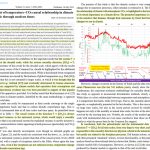
By Kenneth Richard on 15. July 2024
Popular claims that CO2 changes drive temperature changes currently or throughout the distant past “are based on imagination and climate models full of assumptions.” A comprehensive new study details a stochastic assessment determination of the sequencing of CO2 variations versus temperature variations since the 1950s, over the last 2,000 years (the Common Era), and throughout […]
Posted in Climate Sensitivity, Paleo-climatology |
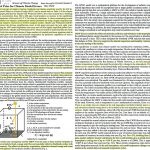
By Kenneth Richard on 12. July 2024
A new study comprehensively eviscerates a 57-year-old modeling paper upon which nearly the entirety of the IPCC’s CO2-drives-climate paradigm is based. Dr. Roy Clark has published a new 73-page study that rips apart the Manabe and Wetherald (1967) paper (MW67) that effectively hatched the IPCC-popularized concepts of CO2 climate sensitivity, radiative forcing, and positive/negative feedbacks […]
Posted in Climate Sensitivity, CO2 and GHG |
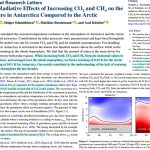
By Kenneth Richard on 16. May 2024
The phenomenon of increasing the concentration of greenhouse gases (water vapor, carbon dioxide, methane) is assumed to lead to sharply rising temperatures in polar regions, or “polar amplification.” As it turns out, it doesn’t. Per a new radiative forcing model (Notholt et al., 2024), increasing CO2 from pre-industrial to present levels (278 to 400 ppm) […]
Posted in Antarctic, Arctic, Climate Sensitivity |
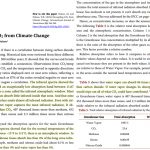
By Kenneth Richard on 2. May 2024
“CO2 is only present in the atmosphere in trace amounts (0.04%) and lacks sufficient enthalpy to have any measurable effect on the atmosphere’s temperature.” – Nelson and Nelson, 2024 New research (Nelson and Nelson, 2024) further documents the inconsequential role that CO2 plays in climate. Less than 4% of longwave infrared radiation is absorbed by […]
Posted in Climate Sensitivity, CO2 and GHG, Paleo-climatology |
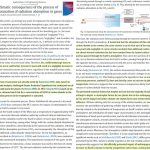
By Kenneth Richard on 23. April 2024
Adding CO2 to the atmosphere can have no significant climatic effect when rising above the threshold of about 300 ppm. Due to saturation, higher and higher concentrations do not lead to any further absorption of radiation. If one were to paint a white surface black so as to allow it to absorb as much heat […]
Posted in Climate Sensitivity, CO2 and GHG |
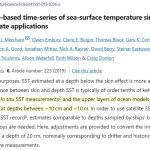
By Kenneth Richard on 8. February 2024
The shallowest sea surface temperature measurement limit is 10,000 times deeper than the extent of CO2’s radiative influence. When sea surface temperatures (SSTs) are measured, the depth range of the measurement typically extends from 10 cm to 10 m, or 100 mm to 10,000 mm (Merchant et al., 2019). Image Source: Merchant et al., 2019 […]
Posted in Climate Sensitivity, CO2 and GHG, Oceans |
By Kenneth Richard on 5. February 2024
In 2023, hundreds of scientific papers were published that cast doubt on the position that anthropogenic CO2 emissions function as the climate’s fundamental control knob…or that otherwise serve to question the efficacy of climate models or the related “consensus” positions commonly endorsed by policymakers and mainstream media sources. There are significant limitations and uncertainties inherent […]
Posted in Climate Sensitivity, Natural Variability, Paleo-climatology, Scepticism, Uncertainty Error
By Kenneth Richard on 25. January 2024
“There can be no climate equilibrium state that can be perturbed by an increase in the atmospheric concentration of CO2…” – Clark, 2023 The anthropogenic global warming paradigm has a magnitude problem – especially when it comes to the assumption that we humans can warm the ocean with our CO2 emissions. New research suggests the […]
Posted in Climate Sensitivity, CO2 and GHG |
By Kenneth Richard on 22. January 2024
Doubling the 2005 CO2 concentration (380 ppm) to 760 ppm only produces a globally-averaged 2.26 W/m² perturbation at the top of the atmosphere (TOA). This doubled-CO2 forcing is close to 0 W/m² for large portions of the globe – including below 0 W/m² for Antarctica. The IPCC claims doubling CO2 produces a 3.7 W/m² TOA […]
Posted in Climate Sensitivity, CO2 and GHG |
By Kenneth Richard on 18. January 2024
We have updated our “Extremely Low CO2 Climate Sensitivity” scientific paper list with new papers added from 2022 and 2023 and some newly discovered papers from the past. As of 2016 this list had only 50 papers on it (as indicated by the web address). In less than 8 years the list has grown to […]
Posted in Climate Sensitivity, CO2 and GHG |
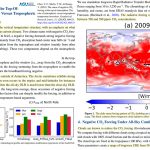
By Kenneth Richard on 15. January 2024
“Negative TOA [top of atmosphere] forcing of CO2 increase also happens outside of Antarctica. The Arctic sometimes exhibits strong negative CO2 forcing. This phenomenon even occurs in the tropics and mid-latitudes…” – Chen et al., 2024 It has previously been reported that as CO2 increases from 380 ppm to 1000 ppm, the CO2 greenhouse effect […]
Posted in Antarctic, Arctic, Climate Sensitivity, CO2 and GHG |













Recent Comments